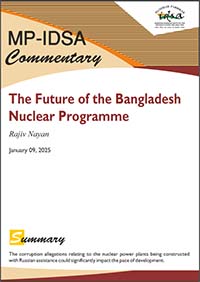The Future of the Bangladesh Nuclear Programme
- January 09, 2025 |
- IDSA Comments
After the removal of Bangladesh’s elected President, Sheikh Hasina, the country’s ambitious nuclear energy plan is facing a crisis. The current leaders and officials in Bangladesh appear to have brought the nuclear energy project under scrutiny. A special team from the Anti-Corruption Commission (ACC) of Bangladesh recently issued a statement expressing concerns about potential corruption in the nuclear deal between Bangladesh and Russia.
Naturally, the interim government has raised suspicions regarding the actions of Sheikh Hasina’s administration and its officials, including members of her family. Her son and others have been accused of misappropriating US$ 5 billion by inflating the cost of the nuclear power plants built by Russia.1 These allegations were later denied by her relatives. The issue was raised by a segment of the Bangladeshi media, and even the Bangladesh court was approached for clarification.
Tulip Siddiq, a relative of the former Prime Minister and the current Treasury Secretary in the United Kingdom’s Labour government, was accused of bribery in connection with the nuclear deal. Reports indicated that the UK Cabinet Office’s propriety and ethics team investigated her role.2 The issue generated significant political heat in the UK. However, Siddiq denied any substantial involvement in the deal, asserting that it took place well before the current Labour government came into power, with her role limited to a photo opportunity.
In December 2015, Rosatom, the Russian state-owned nuclear company, was awarded the contract to construct two VVER-1200 reactors with a total capacity of 2400 MW in Rooppur, located approximately 160 km from Dhaka.3 A bilateral document outlines the financing for the project,4 with agreements signed as early as 2011.5 These Russian-designed nuclear plants will be Bangladesh’s first nuclear power plants.
Rosatom has responded to the ACC’s statement by claiming that the allegations aim to discredit the country’s first nuclear power plant.6 The company also stated the following:
Rosatom is committed to transparency and the fight against corruption in all its projects, maintaining an open procurement system. External audits regularly confirm the transparency of the business processes involved. Rosatom State Corporation is ready to defend its interests and reputation in court.7
Can this controversy undermine Bangladesh’s nuclear energy ambitions? What are the potential implications? Despite a large reservoir of untapped natural gas reserves, Bangladesh faces a significant crisis in the gasification of existing plants,8 and even the exploration of gas has been mired in corruption cases that have drawn attention in the courts9 and the media.10
In line with the global trend of diversifying energy sources, Bangladesh has opted to pursue nuclear energy. It appears that the country has long planned to go nuclear,11 as this could significantly enhance its energy security and help address climate change by reducing its carbon footprint. It is anticipated that the two nuclear power plants will supply around 10 per cent of Bangladesh’s energy needs.
Despite the allegations, Bangladesh’s nuclear establishment appears to be pressing forward with the plan. Notably, Muhammad Yunus met Aleksandr Mantytsky, the Russian Ambassador to Bangladesh, to discuss continuing the nuclear power plant contract.12 A press release from Rosatom on 18 December 2024, stated:
The construction and installation works are complete at Unit 1 of the Rooppur Nuclear Power Plant (NPP) being built by the Engineering Division of State Atomic Energy Corporation Rosatom in Bangladesh. The NPP personnel have started a large-scale test programme.13
The statement further elaborates:
During this phase, the operability of equipment and mechanisms will be tested, including the reactor coolant pumps (RPC), which will be launched and tested for the first time. The outcome of this program will be the testing of the reactor plant at its rated parameters without nuclear fuel. The program must confirm that the equipment meets all design specifications. After completing all tests, the Unit will be ready for start-up operations.14
Although Bangladesh has been exploring uranium deposits domestically for several years, it will be getting 5 per cent enriched uranium fuel for the Rooppur reactors during their entire life time. In 2023, it received uranium from Russia for the plant.15 The entire nuclear fuel came in seven batches by air.16 The first plant will be loaded with 163 fuel assemblies.17
Bangladesh has continued to send its nuclear scientists for training in Russia, even as late as December 2024.18 On 1 July 2024, Rosatom announced that it had already imparted pre-licensing training to Bangladeshi nuclear specialists.19In June 2015, a member of the Bangladesh Atomic Energy Commission (BAEC) gave a detailed presentation on the human resources development programme for the country’s nuclear infrastructure,20 including the Rooppur Nuclear Power Plant. He stated that the BAEC already employed 2,000 individuals and highlighted the organisation’s working relationships with the International Atomic Energy Agency (IAEA), Japan and India, among others.
The BAEC proposed a ‘tentative organisational structure’ for the Rooppur plant, comprising a technical workforce of 1,048. This workforce was to include qualified professionals, technicians/technologists and craftsmen in a ratio of 49:31:20, respectively.21 According to the plan, all technical personnel were to be fully trained by the time construction was completed. To achieve this, the foundational work was to be carried out in Bangladesh’s educational institutions.
A study reported that Bangladesh would need at least 1,600 trained engineers22 to operate the planned Rooppur nuclear reactors. By October 2023, Rosatom Director General Alexey Likhachev announced that the Russian company had already trained 1,000 Bangladeshi engineers.23 He also told that Russia would train 1,500 of the required 2,000 main staff required for the plant.24 Additionally, Bangladesh sought training support from India and its Global Centre for Nuclear Energy Partnership to equip personnel to manage various aspects of the nuclear reactors.
It seems far-fetched to assume that Bangladesh’s nuclear energy plan will come to an end due to the corruption scandal. However, the effects on the pace of development could be significant. Investigations often impact operations, as personnel involved in a project tend to become overcautious and inflexible about procedures. Previous allegations regarding corruption in the Rooppur project centered on trivial matters, such as the purchase of pillows for apartments. While this may seem insignificant, corruption in any aspect of business, especially when dealing with strategic goods, should not be overlooked. Whether involving nuclear deals, arms, or other items, corruption is a serious concern and must be probed objectively. However, such investigations should not be influenced by political considerations—whether domestic or global—as doing so will only undermine the working atmosphere. It could also limit future participation in the project from both domestic and international entities.
Currently, there is an impression that the caretaker government is under pressure to undermine the Russian nuclear deal. This pressure may stem from global nuclear rivals or from Russia’s political and strategic adversaries.25 The installation of the interim government itself has been controversial, with some accusing a Western deep state of orchestrating political instability to remove Sheikh Hasina from power.26
Furthermore, the website most vocal against the Russian nuclear deal has been described as obscure by Bangladesh’s mainstream media,27 with some suggesting it was promoted by vested interests seeking to undermine the Sheikh Hasina government. According to a Bangladeshi newspaper, the website has a history of posting articles that resemble blogs rather than news reports, often lacking evidence and corroboration.28 The newspaper also highlighted several inconsistencies and questionable areas in the claims of money being embezzled from the nuclear deal and hidden in a bank in Malaysia.
The cost of the Plant is estimated to be US$ 12.65 billion. An official document of the bilateral nuclear deal notes:
the governments of Bangladesh and Russian Federation signed an intergovernmental credit agreement (IGCA) of $ 500 million state export credit on 15 January 15, 2013 for financing the preparatory stage construction activities of Rooppur NPP. Bangladesh also signed another IGCA amounting $11.385 billion on 26 July 2016 for financing the construction of the 2,400MW nuclear power plant at Rooppur.29
While the Rooppur nuclear power plant may not face significant obstacles, if the political crisis persists, the current Bangladeshi government could struggle to fulfill its international commitments, including paying interest on the loans extended for the plant’s construction. Bangladesh, as per the media report, was struggling to repay US$ 800 million of loan and its interest.30 The caretaker government will need to present conclusive evidence to support the corruption allegations; otherwise, its credibility will be severely damaged. In such a case, the West may not come to its aid, either in nuclear matters or in any other business dealings.
- 1“Ousted Bangladesh’s Prime Minister Sheikh Hasina, Her Son Sajeeb Wazed Joy and Niece Tulip Siddiq Embezzled $5 Billion From Overpriced $12.65 Billion Rooppur Nuclear Power Plant Through Malaysian Banks”, Global Defense Corp, 17 August 2024; “Rooppur Nuclear Power Plant: Separating Fact from Fiction in the $5bn Embezzlement Allegations”, Dhaka Tribune, 20 August 2024.
- 2“Tulip Siddiq Questioned over Multibillion-pound Embezzlement Allegations”, The Guardian, 23 December 2024.
- 3“The Main Construction and Installation Works are Completed at Rooppur NPP (Bangladesh)”, Atom Media, 18 December 2024.
- 4“A Snapshot on Rooppur Nuclear Power Plant Project”, Construction of Rooppur Nuclear Power Plant Project.
- 5“Russia hands over nuclear fuel to Bangladesh”, RT, 5 October 2023.
- 6“Rooppur Nuclear Power Project is for Well-being of People of Bangladesh: Rosatom”, The Hindu, 24 December 2024.
- 7 Ibid.
- 8“Bangladesh’s Chronicle of Shoddy Gas Exploration”, The Daily Star, 25 February 2023.
- 9“Decision on the Corruption Claim”, Jus Mundi.
- 10“All Corrupt Ministers of Power, Energy Sector Should Face the Music”, Dhaka Tribune, 26 October 2024.
- 11“A Snapshot on Rooppur Nuclear Power Plant Project”, no. 4.
- 12“Russia and Bangladesh Discuss Ties Amid Political Turmoil”, RT, 28 August 2024.
- 13“The Main Construction and Installation Works are Completed at Rooppur NPP (Bangladesh)”, no. 3.
- 14 Ibid.
- 15“RT News – October 06 2023 (09:00 MSK)”, RT, 6 October 2023.
- 16“Six More Uranium Shipments in Next Six Weeks”, Dhaka Tribune, 30 September 2023.
- 17 Ibid.
- 18“In 2024, over 1,200 Foreign Atomists Did Training and Skill Development Courses at Russian Training Facilities and at Russian NPPs”, Atom Media, 26 December 2024.
- 19“Pre-licensing Training of the Personnel for Operation of Rooppur NPP (Bangladesh) was Completed”, Rosatom, 1 July 2024.
- 20 Engr. Md. Monzurul Haque, “Status of Nuclear HR Program in Bangladesh”, Round Table on Integrated Solution for Personnel Training and Development of Nuclear Infrastructure for National Nuclear Programmes, ATOMEXPO – 2015 Moscow, Russian Federation, 1–3 June 2015.
- 21 Ibid.
- 22“Opportunities and Challenges of Nuclear Energy Introduction in Bangladesh”, Bangladesh Power Management Institute (BPMI) September 2020.
- 23 Syed Shukur Ali Shuvo, “Bangladesh Steps into Elite Club of Nuclear Energy Producers”, BSS News, 5 October 2023.
- 24“Russia to Train Majority of Future Staff at Rooppur NPP — Rosatom CEO”, TASS, 5 October 2023.
- 25“How Russia is Using Nuclear Power to Win Global Influence”, Financial Times, 19 June 2024.
- 26“Decoding the ‘Long Arm of the US Deep State’ in Bangladesh Unrest”, India Today, 14 August 2024.
- 27“Rooppur Nuclear Power Plant: Separating Fact from Fiction in the $5bn Embezzlement Allegations”, Dhaka Tribune, 20 August 2024.
- 28 Ibid.
- 29“A Snapshot on Rooppur Nuclear Power Plant Project”, no. 4.
- 30“$800m Repayment to Russia in limbo”, The Daily Star, 6 October 2024.






